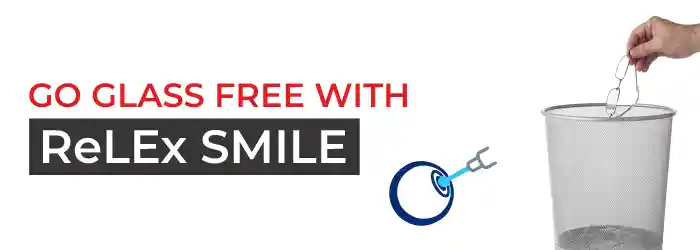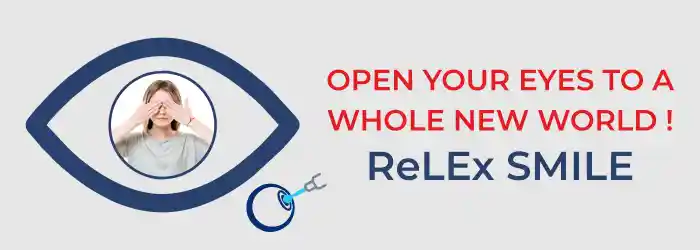
Everything you need to know about smile eye surgery
A smile is regarded to be a universal language, capable of conveying love and excitement while breaking down barriers. Similarly, SMILE (Small Incision Lenticule Extraction) surgery is becoming more and more well-liked in the world of ophthalmology as a revolutionary procedure that presents a novel approach to vision correction.
What is SMILE eye surgery?
SMILE is a refractive surgical procedure. There are four different types of refractive error:astigmatism (blurred vision at all distances), presbyopia (inability to focus up close), myopia (nearsightedness) hypermetropia (farsightedness).
The capacity to focus a clean image of the world in front of you onto your retina is dependent upon your cornea and lens. To produce a clear image on your retina, light rays must be refracted or bent. Both the lens and cornea work together to accomplish this refraction. Your eyesight becomes fuzzy because of changes in the cornea's shape, which also causes the retina's image to become out of focus.
SMILE surgery alters the curvature of your cornea. The following returns refraction to normal, allowing you to see once more. It lessens the requirement for contact lenses or spectacles. You might even be able to see clearly without them. SMILE is a recent addition. It was authorized in 2016 to treat myopia, and in 2018 to treat astigmatism.
Who is eligible for SMILE?
To be eligible for eye SMILE surgery, you must meet the following criteria:- The minimum age requirement is 18 years old or older
- Your eye care prescriptions should not change in 6 months
- Astigmatism should not be more than three diopters, and nearsightedness prescriptions should range from -1 to -10
- Your eyes ought to be in good condition
- To avoid the negative effects of Relex SMILE eye surgery, we advise against choosing it if you have glaucoma, keratoconus, unbalanced glucose levels, or any allergies related to your eyes
- It is not recommended to have SMILE surgery during pregnancy or nursing; however, it can be scheduled after that time
Is SMILE painful?
By using a refractive eye surgery procedure called SMILE (Small Incision Lenticule Extraction), difficulties with vision like nearsightedness can be corrected. To improve eyesight, the treatment entails making a tiny incision in the cornea and removing a lenticular to reshape it. Although most people have only mild discomfort during surgery, everyone's experience with pain varies. While some patients experience very slight pressure or discomfort, others may experience a short sensation at specific points throughout the treatment. However, since local anesthesia is typically used to reduce discomfort, many patients find the overall experience to be comfortable.
Are you a good candidate for SMILE?
SMILE has some prerequisites, much like any other surgical surgery. These boost your chances of success and keep you safe:- You ought to be at least 22 years old
- Your vision needs to be steady. There should be no changes to your eye prescription from the previous year
- The cornea and eyes should be in good condition
- Your ideal myopia ranges from −1 to −10
- Less than three diopters should be your astigmatism
Who is not a candidate for SMILE surgery?
SMILE surgery can improve your vision and eliminate the need to wear glasses or contact lenses. However, this process isn't suitable for everyone. Certain factors may render you unfit for this surgical procedure:- Thin corneas
- Asymmetric astigmatism
- Corneal scars
- Ectasia progressive (thinning of the cornea)
- Variable (unsteady) refraction
- Eyes with one or both cataracts
- Glaucoma
- Uncontrolled diabetes
- Previous eye surgery or illness
- Pregnancy or nursing
Is SMILE permanent?
Without a doubt, SMILE Eye Surgery is irreversible. Medical research developed it to help nearsighted and astigmatic people. That is when the best outcomes from laser vision correction, such as LASIK, PRK, or another procedure, are not possible. Nowadays, vision correction surgery is the most common option worldwide. It is becoming increasingly popular around the world because to its cutting-edge functionality and success in restoring clear vision. SMILE is the greatest choice if you've ever had dreams of waking up with perfect vision! One feature of SMILE that sets it apart from other laser vision correction methods is the recovery period.

Eye health:
Advantages of SMILE
The SMILE eye surgery treatment primarily offers two advantages. These two are mentioned as follows:Less risk with small incisions
The minor incision is the primary advantage—and a significant one. The outer layer of the eye experiences only slight alterations. Additionally, the healing period is shortened when there are fewer alterations. In addition to the shorter healing time, there is extremely little or no risk of infection. One can quickly return to their regular work after receiving SMILE treatment.
The procedure is safe
Again, the minor incision makes a huge difference. As of right now, we know that this operation is ten times safer than any previous refractive surgery performed on a myopic patient due to the tiny incision. For patients with thinner corneas, this is also a successful course of treatment.
There are no flap issues
This is one of the benefits unique to the SMILE laser eye surgery. In this instance, the procedure appears to be more advantageous than other refractive operations.
Have a look at some Disadvantages
Limited Availability:
Compared to standard LASIK surgeries, SMILE (Small Incision Lenticule Extraction) eye surgery may not be as widely accessible, which could restrict access for certain people.
Surgeons learning curve:
Since the procedure calls for specific training and not all eye surgeons are skilled in SMILE surgery, there may be a greater learning curve.
Potential for dry eyes:
SMILE, like other laser eye procedures, has the possibility of inducing or aggravating dry eye symptoms. However, the incidence is lower than that of LASIK.
However, when you choose SMILE at a reputable institution like Smart Vision Eye Hospital Hyderabad, these downsides are mitigated. Cutting-edge services are provided by the hospital as part of its complete strategy to address the restricted availability, and its best highly qualified surgeons and state-of-the-art equipment help to minimize the learning curve and lower the risk of postoperative problems including dry eyes.
Can SMILE surgery treat astigmatism?
While SMILE is primarily designed to correct myopia, it can also treat astigmatism to some extent. Discolored or distorted vision is the result of astigmatism, which is an irregularly shaped cornea or lens in the eye. A small amount of corneal tissue is removed with a laser during the SMILE operation, which can help correct astigmatism.
It is crucial to remember that the efficiency of astigmatism correction with SMILE may vary depending on the severity of the astigmatism and other personal characteristics. For a more effective astigmatism correction, extra or other procedures such as LASIK (Laser-Assisted In Situ Keratomileusis) could be suggested in certain circumstances.
In a nutshell, Smart Vision Eye Hospital's SMILE eye surgery is an innovative and patient-friendly method of correcting vision. Compared to conventional techniques, this cutting-edge technology guarantees less discomfort and a speedier recovery. Because of the accuracy and safety of the SMILE surgery performed at Smart Vision Eye Hospital, patients may now enjoy life with greater clarity and less reliance on glasses or contact lenses. Smart Vision Eye Hospital stands out for its dedication to quality and becomes a reliable choice for people looking for cutting edge and caring eye care treatments.
EVERYTHING YOU NEED TO KNOW ABOUT SMILE EYE SURGERY